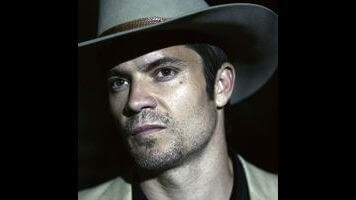Justified: "The Collection"

Right up until the final 10 minutes or so, I was prepared to dismiss “The Collection” as one of the least inspired mysteries Justified has concocted to date. A lot of the details surrounding the death of a wealthy horse breeder—a murder made to look like suicide, a cuckolding wife and trainer, loose money from art dealings—struck me as pretty standard crime material, a few wrinkles on The Postman Always Rings Twice. The one compelling hook in the plot were the Hitler paintings the breeder had amassed as part of his collection, under the unsavory logic that “You can’t get closer to history than right here.”
Beyond the priceless expressions on Raylan and Art’s faces when the breeder, Owen Carnes, started chatting with Cincinnati dealer Karl about his unique assets—which, after Owen’s financial chicanery, stand to be property of the U.S. Marshals—it was just amusing to hear Hitler’s name evoked in this context. (e.g. “I don’t want to sell the Hitlers, but you know the situation I’m in” or “How many Hitlers do you have?”) So it was disappointing that this black market for Hitler paintings was largely dropped in favor of the twisty goings-on between the breeder’s too-obviously duplicitous wife Caryn, their horse trainer Greg, and an art dealer played by Tony Hale, best known as Buster on Arrested Development. (Hale is largely wasted here, but he does deliver one line brilliantly, upon news that Owen may have survived the headshot: “JFK was alive for hours!”)
But then, after the double-dealings that put an end to the murder case, comes a much better twist. Beckoning Raylan back to his gallery, Karl shows him his “collection” of Hitler paintings: Shelf after shelf of ash-filled glass jars, each containing the remains of the Fuhrer’s failed artwork. Karl explains that his father was a proud member of the Third Reich—despite a false recanting of Nazi ideology after the war—but he hated his father and has dedicated his life to collecting and destroying Hitler’s “shitty paintings.” It’s a great, Inglourious Basterds-like moment where, in his own way, Karl can kill the basterd—or at least reduce some of his legacy to ashes.
Elsewhere, there were developments on several fronts, but most of the real drama was deferred. It was great to see Walton Goggins appear as the suspiciously reformed Boyd, asking for Raylan to do some soul-searching in exchange for information on his father. (And leaves us with a nice little cliffhanger, too, about knowing something about Arlo that could put him away for the rest of his life.) Still shacking up with Ava, Raylan passes along Johnny Crowder’s warning that her dead husband’s father is due for release from prison and will almost certainly have revenge on his mind. (Ava says she isn’t going anywhere, which isn’t surprising given that she blew her husband away over dinner. This is a woman who stands her ground.) We also get a brief but potent introduction to David Vasquez (Rick Gomez), the wily U.S. Attorney put in charge of investigating Raylan’s actions in Miami, and some more scenes with Raylan’s ex-wife Winona, whose current husband is up to no good.















![HBO teases new Euphoria, Larry David, and much more in 2026 sizzle reel [Updated]](https://img.pastemagazine.com/wp-content/avuploads/2025/12/12100344/MixCollage-12-Dec-2025-09-56-AM-9137.jpg)
























